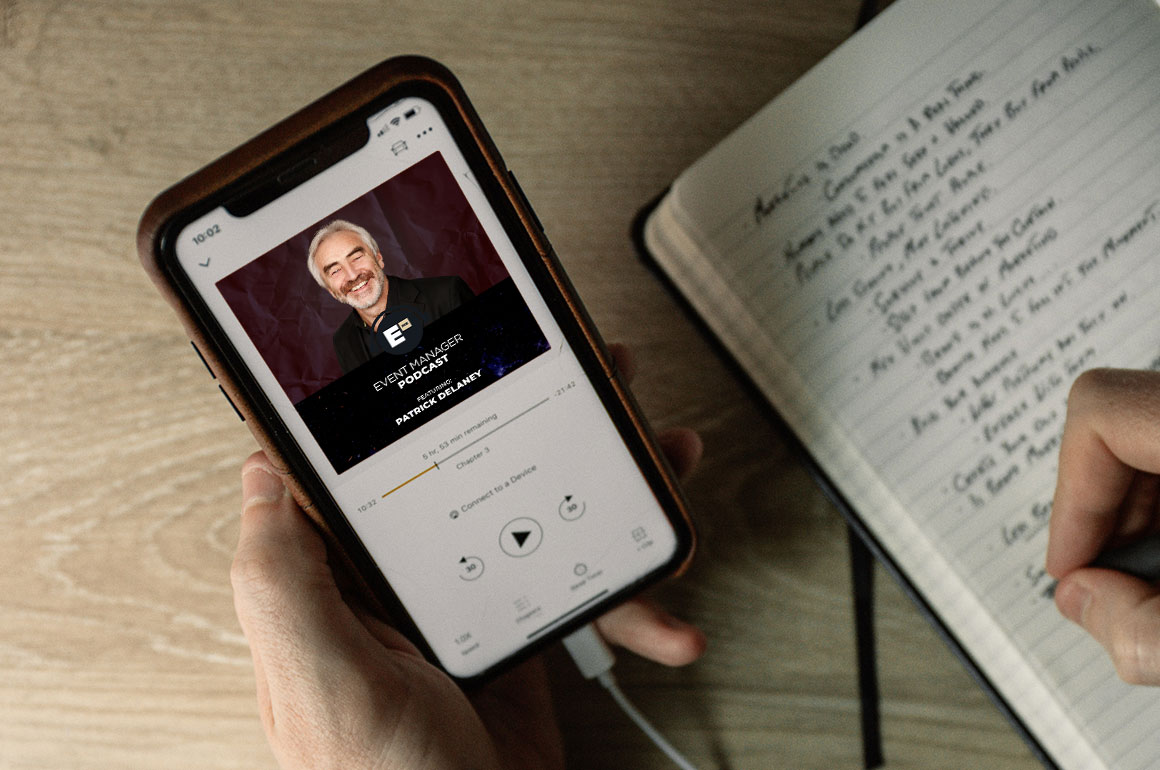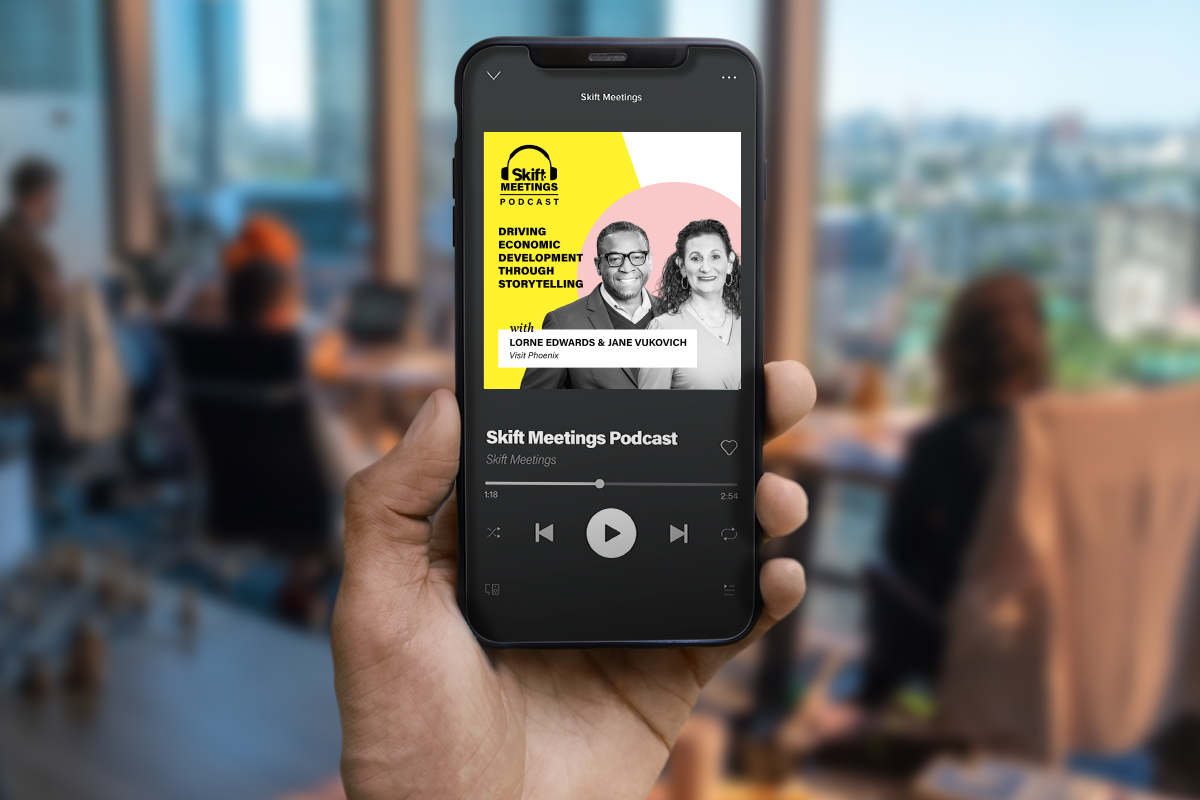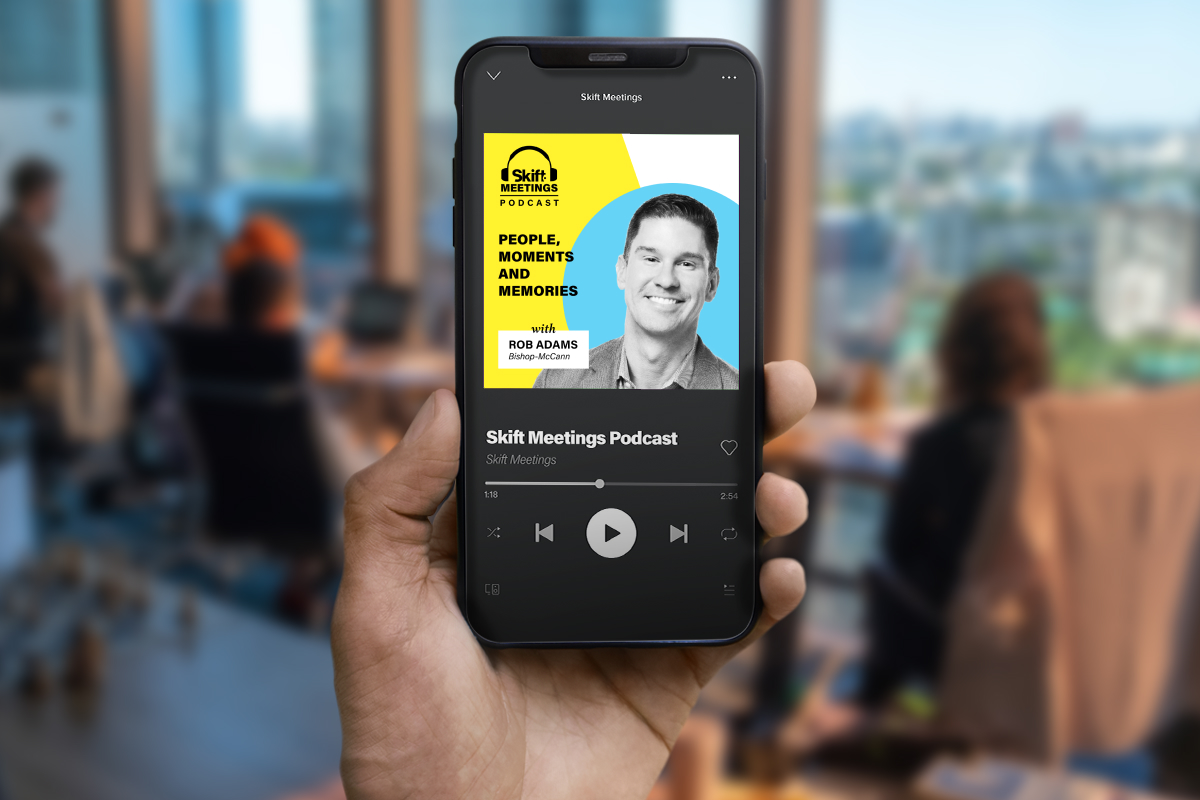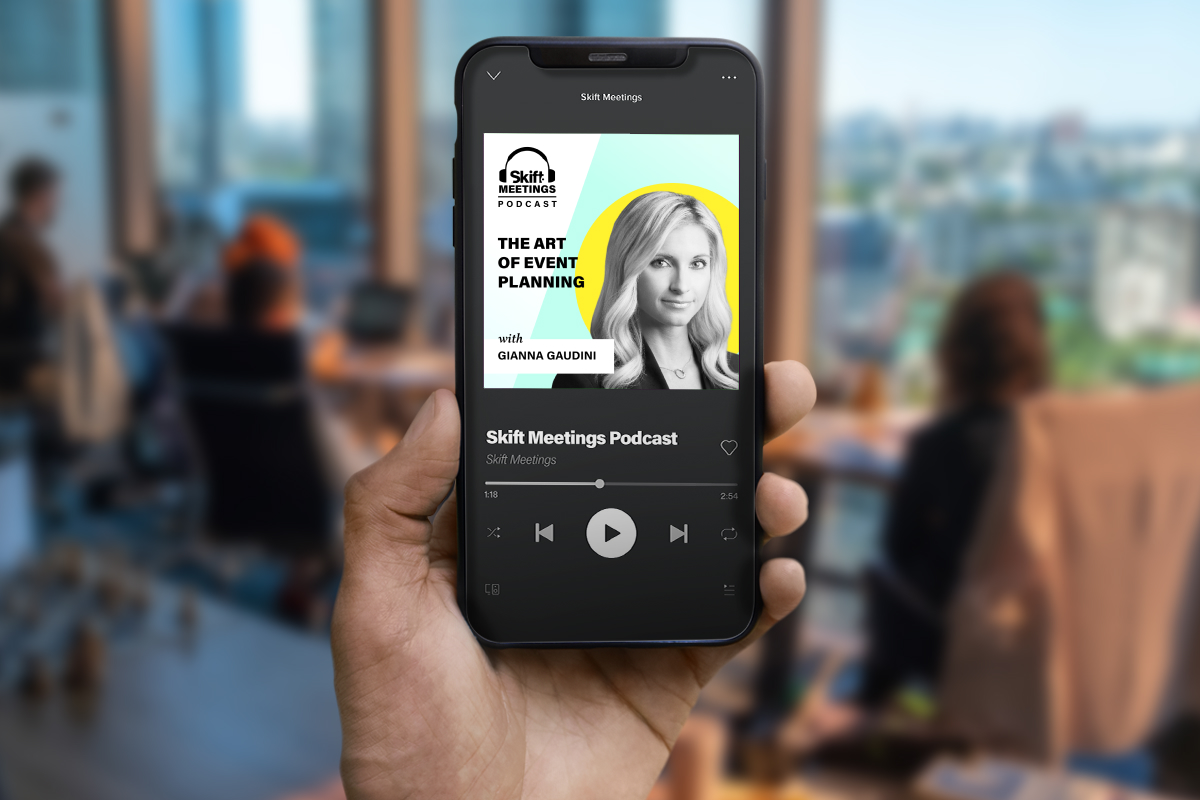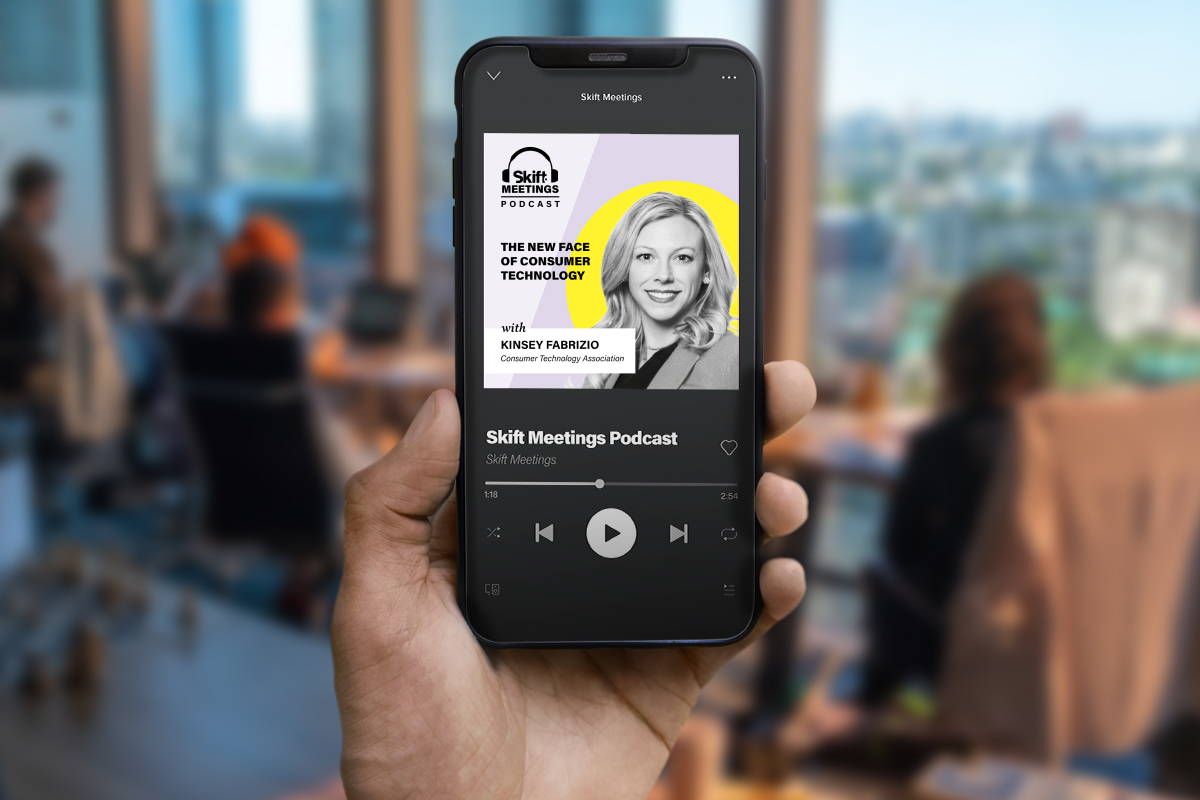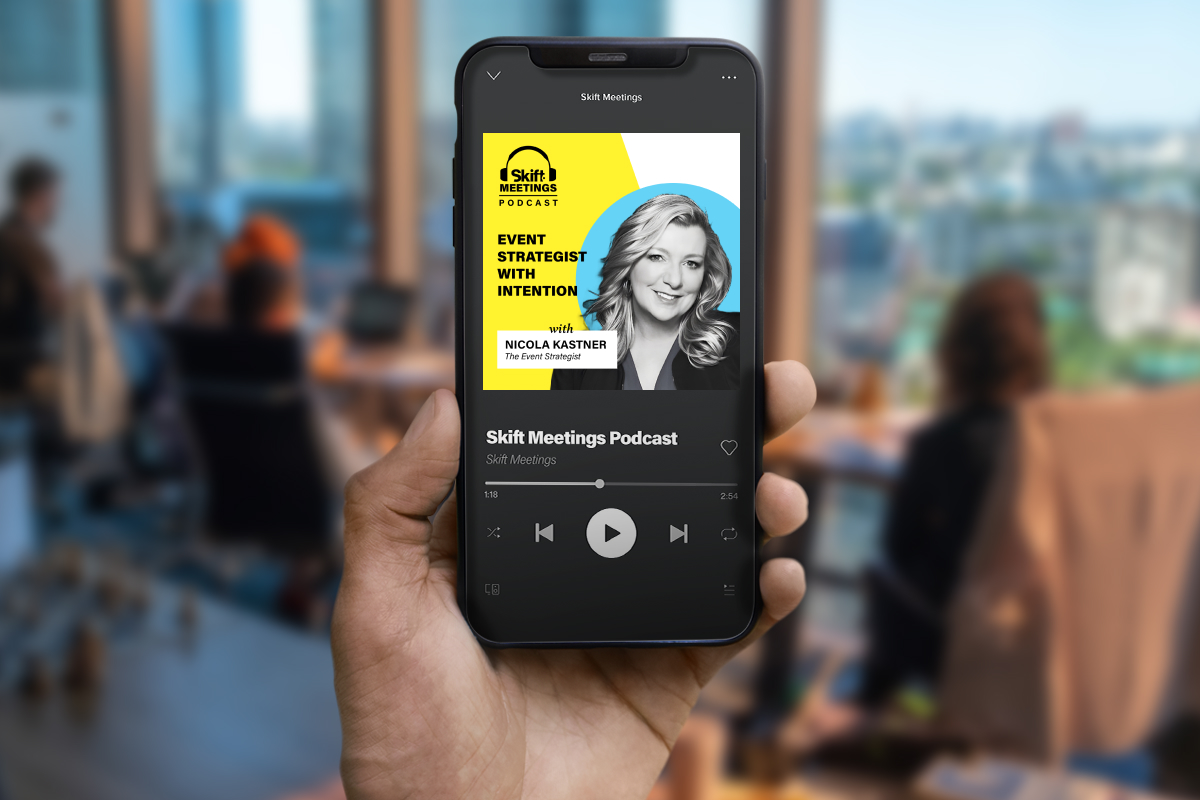Episode #39 of the Event Manager Podcast features Patrick Delaney, Managing Partner at SoolNua in a conversation about the transformative power of travel.
Here are a few of the topics we cover:
- Why destination marketing requires an alternative view
- How destinations have two masters, the visitors and the local community
- Why event professionals should get involved in industry associations and how that can really benefit them
- How event professionals are fortunate to be able to contribute to societal issues, sustainability issues and inclusivity issues
- Why the event industry should aim to be more reflective rather than reactive
Subscribe to the Skift Meetings Podcast: Apple Podcasts | Spotify | Overcast | Pocket Casts | Google Podcasts | Amazon | RSS
Patrick Delaney (PD): I’ve been involved in the meetings and events, the business events side for over 35 years. Background in hotel management, hotel inspector as well, migrated into sales and marketing, and then migrated into destination marketing, and then onto running a classical music festival and then opening a DMC with my business partner, Padraic Gilligan. Our first DMC was called Delaney Marketing Consultants. We changed then into ovation and grew into a very successful company in Ireland. And then we merged with MCI and it was a great privilege to be involved in that company and in its growth. We rolled out the Ovation brand in a hundred different countries around the world. And then eventually at a certain stage, we said, “Hey listen, that was a really good experience, but maybe we wanted to go back to our roots and be a smaller organization.” So then we founded Soolnua, which is the Gaelic word for an alternative view, which I suppose sums up the essence of what we offer. We’re an advisory that works with destinations, venues and companies in helping them with their sales, marketing, training, and strategy in the business events area. So it’s been a journey and it continues to evolve.
Miguel Neves (MN): So why is a different view so important when we’re talking about destination marketing?
PD: Well, I think [offering a different view] is very important in life, not only in destination marketing. We’ve been involved in this business for some time and [we’ve] made an awful lot of mistakes. Not all customers want the kind of offering that you are proposing. I think in today’s world if you’re looking for a safe bet, if you’re looking to do just more or maybe even better what’s already out there, that’s certainly an approach to take. But if you’re looking to make a radical change or making it to make a difference, then you know you do need to take an alternative viewpoint.
And sometimes that requires bravery and then an ability to have the confidence to go look for new markets that reflect the changes that are out there. So, Soolnua definitely is an alternative viewpoint and that’s our proposition. If you’re up for it, so are we, and we won’t accept, uh, any sacred cows, either from our own publicity or from your publicity. And we challenge everything. And I think that that’s a good way to run your life. And I think if it suits you and you’re willing to accept that proposition, it’s a good way to do business.
It does require a willingness to take risks because not everything works and when it doesn’t work, you have to say, “Hey, listen, that didn’t work.” You have to iterate and try it fast and try it again, but you need to start off. I think what’s really important is the attitude with which you start off and you’re willing to continue to learn and figure out, well that works and that doesn’t.
MN: Do you feel like this is something that you’ve always done? Is it something that you’ve fine-tuned or developed even more as you learned the industry and developed the business?
PD: I’d love to think so. I’ve made so many mistakes and when I look back on those mistakes, it’s usually based on arrogance or an unwillingness to take risks. And in that environment, when I was willing to do those two things, one is to listen to people who know more than I do and to stop and think and reflect, then it’s always turned out better, and certainly not the way I intended. I never go into a situation knowing exactly how it’s gonna turn out. But I think what I have become over the years, I’ve been clear about what I think is important. I think I’ve been understood, as I said, that there are, I need to be closer to customers. You need to be closer to what real life is and, and how easy it is to become bound up in your own publicity and your own belief about everything and that I don’t think that’s true. So it might suit my personality, but I think over the years it’s been beaten into me as opposed to coming up with it myself.
MN: When you’re talking to people outside the industry, how do you explain what you do?
PD: I normally say I connect people. I help them learn more about what they know. And I introduce them to things that they don’t know and experiences they have in and had, and that usually kind of people stand back and stop and then allow you to expand on, they, then they, they, they kind of allows you to expand on the fact that you’re not a psychiatrist or a psychologist, although probably that’s, there’s skill sets that do come in and meeting planning. But yeah, it’s a nightmare. And I actually get annoyed with people who try to put our industry in a very limited view as if we just organize meetings as if they happen without any pre-planning without any goals and without any purpose. I don’t mention the meeting or the tourism or the planning anyway, initially, I just try and leave it out in the hope that I can start the dialogue.
I also think it kind of limits the view because I think in today’s world, that’s probably always been the same is that people are very conscious about authenticity sincerity, and you can want to sell your destination or your business offering, but if it’s not something that’s of interest, then you’re wasting your time. You’re trying to teach the pig to sing. And I don’t believe in teaching pigs to sing. I mean, they’re not very good at it, and it’s a waste of time and it annoys the pig. So, therefore, I think you start off with an attitude of saying, Hey, listen, this is what I think if you’re, if you expand your viewpoint, then you can, you can show the potential customer what might be of interest and what are the benefits for him, or horse him in the wider sense of that word.
When the tension is there, then you can try and match the two together and customize it in whatever way. And that could be for an incentive program, it could be for a conference. It could be for a business meeting, whatever that is, but unless there’s a potential for some benefit coming, then it’s a waste of time. And I think today people are even more sensitive because they’re less budget, less time and more interested in choice, and they will decide whether or not you’re gonna do business or not
MN: If a potential client comes to you and says we wanna work with you, but for some reason, it just isn’t right for you. How do you manage that situation?
PD: Well, first of all, I always try to take the business. So my starting point is I’d love to do business with you. I want to be successful and I think when you do business with somebody your proposition is I’m gonna help you be more successful. And in order to do that, you’re going to have to get the best outta me. And sometimes organizations don’t connect personally, you don’t have the right level of offering. For example, we are a small advisory and some people need to have the stamp of a very large organization.
And really what they’re doing is they’re buying the badge. Now, we don’t have a badge to offer in our particular case, we have solutions and they may be even better than those offered by the badge. But if what you’re looking for is the badge, the safe bet. Then there’s, there’s no amount of connectivity that you can generate because it’s not valid. So I think you have to have your own personal pride. You have to have a sense of what’s appropriate, professional, and it’s like the same way should all of that ends take place. Should they take place in this particular way? Absolutely not. Were there meetings going on pre-endemic that were absolutely boondoggles? True. So I think it just plays into that if it’s valid, it’s worthwhile, then we’re gonna do it well, and we’re going to do it in the most effective way possible.
I’ve often chosen clients, but unfortunately, they haven’t chosen me, which is very disappointing.
MN: In destination marketing, what really makes a great campaign or great piece of work?
PD: A great campaign is one that resonates with those it’s aimed at. So, therefore, I think you resonate when you’re relevant and you’re effective in getting out that message. In the old days, in terms of positioning and marketing a destination, it was basically broadcast. [You wanted to] get the awareness up to as wide a group out there as possible because the size of the audience was relatively smaller. If you look at the marketplace today, it’s much more niche. It’s probably more discerning and I think there’s a realization on behalf of the destinations that they have two masters, they have the local community, and then they have the potential visitor, and there’s gotta be a balance between the two.
A great campaign is one that is authentic, one that understands that success also has to be a success for the visitor who comes to that destination and has the wonderful life-transforming experience, but also that it helps to enhance the local communities quality of life. Ideally, there is a balance, but things have changed radically. There was a book I remember reading in college called, Tourism – Blessing Or Blight by George Young that came out in the mid-seventies, but that question is always out there. Is a great campaign, something that brings loads and loads of visitors to a destination, and then turns that destination into exactly what people didn’t want to come to in the first place. We saw there was a turn in a number of destinations prior to the pandemic where over-tourism was completely ruining the experience for the visitor and the experience for the locals.
MN: What trends have you’ve seen change throughout the years in terms of what campaigns really resonate?
PD: The platforms through which the campaigns are mediated through that have changed radically. The fundamental of a successful campaign has always been to be authentic. It has to resonate with the audience. It has to be true, and great campaigns have a little bit of humor. And if it has an emotional connection, prior to the digital age, those campaigns were done in a much more analog way, and it was harder to target the appropriate recipient of the message. It was harder to get the vast exposure you need today, especially at the price points. Great campaigns are still the same as they always have been in terms of their fundamentals.
In terms of the media used to get that message out and get that connectivity going, there’s a much more discerning audience, probably a more learned audience. There are very few countries in the world I haven’t been to but I achieved that over a long period of time. Now I sit down with my kids and they’ve just come back from South America, and they’re off to Thailand or they’ve just come back from some great destination in Europe. I had barely left the country when I was 30. So I think there’s a different audience out there. I think that’s a big change as well.
MN: You have worked a lot with incentive programs, you do destination marketing, but you also do a number of other things, you emcee events, you build conference programs, you consult. How do you balance all that?
PD: You asked me who I am. I’m curious. And part of that curiosity is that need to be exposed to, and learn new things comes via some of the things that you mentioned. I do call them a privilege to be involved in the IACCA best marketing Awards or working with IAPCO, with PCMA, or, with SITE. You get exposed to a lot of smart people, a lot of great content, and new things I just had no idea were out there and I’m learning from that.
I follow you, I follow your blogs. I listen to them. I think, God, why didn’t I think about that? That’s so smart. That’s so interesting. So I think I’m, I’ve always been interested in doing a number of things and I feel privileged if I’m asked to emcee or participate in other conferences is a great way of getting exposed to new content. So I put a priority on making time to do them because I think it helps me grow as a person. And I want to continue to do that. And as a professional, I need to do that as well. So it’s a great platform for me to learn.
I would really advise anybody who hasn’t been involved in any of the organizations to be involved in associations, and not just pay your membership. It’s a waste of money. If you get involved, then you will learn and you’ll be a better person. I think that’s a really, really special thing that I think we don’t do enough of. We say, I’ll take out a membership or I’ll just turn up. I didn’t enjoy that conference. It was useless, but that chance to interact with people on a personal professional [level]. You and I keep in contact over those years. We wouldn’t have met if we hadn’t been involved in associations, and I feel privileged that no matter where I go around the world, I know people, I can learn from them, I get insights into their destinations, into their lives. It’s just fantastic.
Miguel: You’re really taking the mantra of the connector and connecting always with you.
PD: I think it’s fundamental to my character. It’s fundamental to what I believe we need more of. In these really dark days with the situation in Eastern Europe, meaning we need to connect. And when you connect, when you get to know other people, it’s very hard to get annoyed with them. And it’s certainly very hard to fight with them. And then you also realize we can do things together. If we can learn about that and you can see it at conferences, that exchange and knowledge. When people go to different destinations, they learn that maybe all those wonderful people are not as different as I am. They just have maybe different upbringing and maybe their view of life is something that I could take on board and I should do that. So that connectivity is so important. It certainly expanded my view of the world and hopefully, the world is a better place for it, but I am certainly a better person for it.
MN: Have you considered writing a book? What would you write about? What would you call the book?
PD: There’s no way when I reflect back over my career did I plan to go into this wonderful sector but through the good fortune of other people. I have been exposed to opportunities and experiences that I would not have, but I’m Irish, which of course is a privilege in life. I grew up in Dublin, probably if I looked at lots of my friends, they enjoy living in Ireland. It’s a fantastic place to live, but they haven’t been to the many destinations around the world that I’ve had and they haven’t met the people. They haven’t met the people and learned what’s out there. I’m just so motivated by the different experiences because I think that’s a great thing about our industry that we don’t celebrate.
It’s obvious, because when we went to talk to the government, they still don’t understand what we do, but we don’t celebrate the potential to have an impact. I’m just so delighted that impact and legacy are becoming two platforms for what people are talking about. We can have a really positive impact for good on a level that is far beyond my pay grade.
MN: I detect a great sense of just humbleness and gratefulness for having these opportunities.
PD: I have lots of reasons to be humble. Anybody that knows me as you do can reaffirm that, but we are privileged. We are privileged to have those levers in our hands, to participate, to play our part in any of the societal issues, the sustainability issue, inclusive inclusivity, all of those issues, we can play a part and we have the ability to do that. We just need to take the opportunity and we need to shout it out and we need to celebrate the fact that we can do that and then be recognized. That’s the platform we have and certainly, that will get us over the dark nights when you sit around and think, why am I doing this bloody thing? What’s the purpose? I think that purpose is certainly what drives me. I think we need to always be clear about the purpose and we’ll have a big purpose in life if we take that opportunity.
MN: Events may seem very lighthearted and simple, but there can be important purposes behind them.
PD: That doesn’t mean that we don’t have fun. And the purpose is certainly to bring joy and enjoyment. I’m not carrying the burden of the world on my shoulders. What I am carrying is the opportunity to let people grow personally and have brilliant experiences.
From a destination point of view, when you really have an experience, when you get to know the locals, you get to know what’s important to them. Your life is expanding. You have a lot of fun. You have a lot of “craic” as we’d say in Ireland, and that’s really energizing
MN: What are the biggest challenges facing the event industry?
PD: Real life is very much in front of us. If your heart doesn’t break to see those scenes of refugees struggling to survive when you have a situation that is really hard to understand why you have such a terrible imposition of one nation against another. Probably it’s not the nations, it’s the leaders because there’s so much historical and cultural connectivity between Ukraine and Russia. So that’s really sad and I’m kind of reluctant even to talk about bigger issues when being alive and staying alive is the most important thing.
But if you take that being alive and staying alive and just transform it into a slightly bigger environment, you get sustainability. That has to be the biggest one, because if we’re not in existence, if we don’t listen to the science at every report that comes out and I’m not somebody that has always [understood this], like my good friend Guy, Bigwood, who’s been talking about this for quite some time. I’m too stupid to have figured it out, but even I can understand that science is telling you that unless we do something, we are not going to be around. And if you’re not around, you cannot make those connections, you cannot build. So I think that’s obvious in terms of the wider issues for us to address because there won’t be some of those wonderful destinations around the world, they won’t exist.
Those that do exist they’re suffering the climate [catastrophes]. We can see it in the floods, the fires, things that are fundamentally changing those destinations and what we find attractive about them. That’s all based on the sustainability aspects and we have to meet that challenge head-on. It means that we all have to take our actions being very practical. I don’t want to in any way undermine the seriousness of the Ukraine situation because I just cry when I think about that waste of human life, but I think taking that as a theme, then sustainability has to be the big issue.
If we do get that together, then what type of events we run, we get back to: do they have a purpose? How will they run the operational side? Should they happen in the first place? And these are questions that have always been there, but they’ve become more imperative to answer intelligently. It’s much more immediate. What are the types of experiences that those events that should take place [have] and how they [impact] all of those issues we’re facing? These are not my particular insights. They’re just out there and they’re obvious to everybody how we include people and how we make sure that these issues are addressed and that these are not woke issues. These are real issues that you face every single day. I really object to people when they kind of say this means sacrifice and it means actions. So when I’m talking about sustainability, I always think of showers. I love letting the water run for hours and hours but I’ve gotta stop doing that. That’s stupid. So you have to get down to really practical issues as well as the bigger issues. So we just have to start changing our behavior and I’ve got to be the first one to start.
MN: How serious do you think the industry really is about sustainability? How can we really make a difference?
PD: I always look at myself first of all and I freely admit I’m on a journey and that journey has been one where I would be the first one to say it’s really important, but not me. Let somebody else start. So if you reflect on these things, we as an industry have been wasteful and we continue to be wasteful, but I think we can change. If you think about the offering that we make in terms of going to a destination. If I’m going to an event, what’s the purpose? What’s the outcome? What’s the impact of that? I am totally committed to the idea of bringing people together because I think the benefits of bringing people together, whether you’re going to a destination you’re learning, you can’t fight with people, you can’t fight with them to that kind of level.
So their whole idea of travel as a transformative experience is really important [but, we] will probably have to do less of it. We probably have to do it in a different way when we come together, how we run those meetings, but they’re all relevant issues that we should have been asking anyway and we weren’t asking. So, are all incentives good? Is an incentive the ultimate boondoggle? You could ask that question. Well, if it doesn’t change behavior, if it’s not based on the idea of why you run an incentive program at all, to reward and change behavior. There’s a purpose. If that purpose is valid and is relevant for today, then you should do it because it has a positive legacy and impact. But we have to ask this question and I certainly have to ask myself that question every single day. And sometimes the answer is no, I’m not doing enough. I’m not taking it seriously, but that doesn’t mean that the question isn’t an irrelevant one.,
MN: It is important that we are honest about such a big issue and one that may make significant changes in the industry.
PD: Oh, it will. It is self-preservation. If we don’t do something. You can see it out there, it’s obvious. If we don’t do it, we don’t have an offering and if we don’t have an offering, we’re not in business.
MN: If you had the power to really change something in the industry, what would that be?
PD: I think I would like to change, is to understand what we do and why we do it, and to be more reflective on that. I think if I did that more, then the choices I make would be more appropriate. They’d be more effective. I’m the guilty party hands up. I’m very reactive. I’ve been very immediate, not looking in any way beyond my nose, but I think if I was to try and do what I’m trying to, I think it might help others as well. If we reflected more and took even a slightly more long-term view of what we do and how we do it, I think [things] would change radically. I think that would benefit the industry and it would benefit the world.
If I had the magic power to make us all stop, which I suppose in one sense was the training course that we all did through the pandemic, where lots of things that I took for granted were taken from me immediately. It was a right kick in the …. And it made me stop and made me reflect and much more than I would’ve normally because I was running around like a headless chicken.
I think I certainly could reflect more. Then maybe you decide to do the same things, or maybe you decide I’m not gonna do that at all or I’m certainly going to do it differently, but at least I’m asking myself those questions before I jump back in.
MN: Do you have any sort of clear vision or any vision of how events, incentive travel and destinations are going to be different in the future?
PD: Let me tell you. Anybody that tells you they know, I would say treat them with a high degree of skepticism. I believe that our industry is relevant. I think what we do is important. So I think there will be an industry. That’s a good start. Happy days, there is a future out there. What does it look like? A lot depends on what we do and on how we approach it. Because I think there is no doubt that choice on behalf of customers has been more finely tuned. Whether they get what we’re offering and how they’re going to access that, virtually online? When we have face-to-face, will it be much more experiential? Will the experiences be more relevant, more real? Absolutely. All of those things seem to make sense in terms of how we promote destinations, that they have to be more balanced in terms of the offering and the impact on the local community.
I think all of those parameters are out there and that’s all I know. I can see those being pillars from which we will need to bounce off and define our plans. How that’s gonna look I don’t honestly don’t know, but I have this overall arc and narrative that in terms of customer’s choice, they’re going choose with much more discernment, whether it’s because they are more knowledgeable about how our business works or what’s important to them. Therefore [that impacts us] as providers of that supply chain. If you look at the immediate sense, some of the great suppliers that we would’ve all known are not around anymore, or they’re a lot more slimmed down than they were.
I think the way we go to market and particularly the reason why is gonna be much more important. If we can find that connection, then it will happen. But in truth, I don’t know, but I see those as pillars that won’t change and each destination and each business is going to have to fine-tune their offering in relation to those pillars [in terms of] relevance, purpose effectiveness.
What [this] always reminds me is when people are talking about which platform I will use? Is it gonna be digital? Is it gonna be face to face? [What we need to ask is], why are you running the event in the first place? What’s the purpose of it? And therefore what’s the most appropriate medium. Then you choose what’s going to give you the best results. That’s the most appropriate legacy. That’s the kind of thinking and in that framework, the future will be mapped out. If we think about anything else, we’re just gonna get it “arseways” around.
MN: So being more reflective is going to change things from all angles. The exact setup of events may not change that much, but there is a deeper change that is likely to happen.
PD: Yes, and that can have a radical change in what we do because the event may not take place. That trip to that destination may not take place, or it may take place for a longer period of time or with a different combination of people in terms of scale or size. So all of those things are going to change the supply chain, and we’ll have to react to that because that’s a different offering.
But the good news is I absolutely believe that travel is a really positive, transformative experience for most people. I really believe that business meeting events are critical to a better world, a better society, and can be really effective.
I’ve never been as convinced before because I can see in their absence, what was missing. How we fine-tune that offering will be as radical as that won’t happen at all, or the way in which it happens will be very different. That requires taking risks and maybe they, some things that we liked or were very profitable go, and we have to try and find an alternative, which is why I suppose coming back to the ability to take risks and to take a different viewpoint is really important at this stage.
